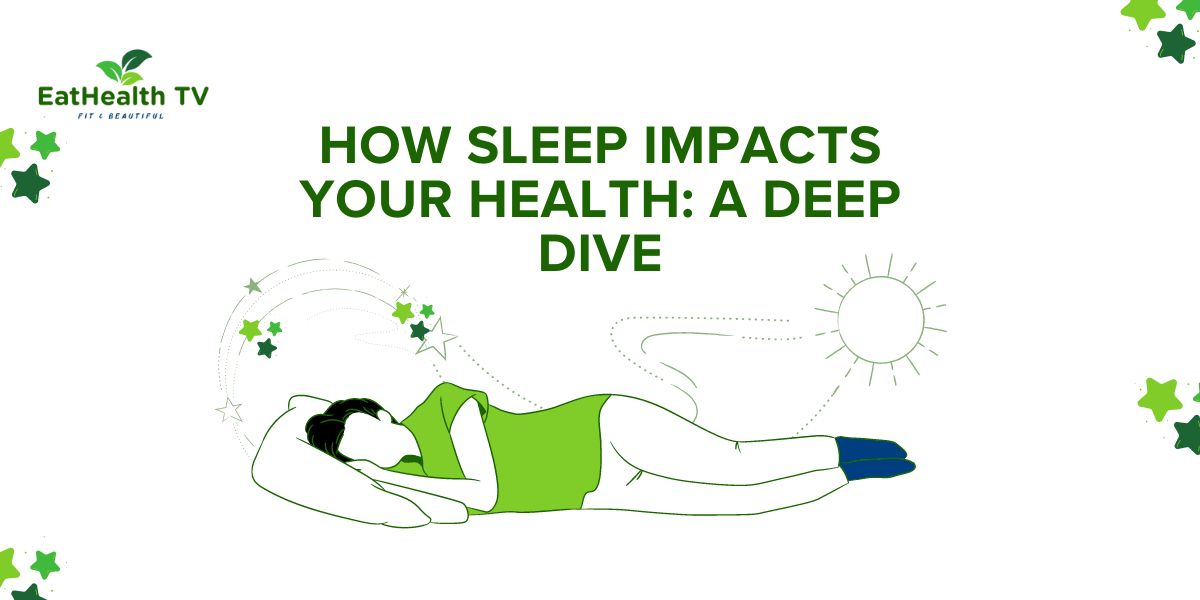How Sleep Impacts Your Health: A Deep Dive
Unveiling the Power of Quality Sleep: Enhancing Health and Well-being

How Sleep Impacts Your Health: A Deep Dive
Sleep is a fundamental aspect of human health, essential for physical, mental, and emotional well-being. Despite its importance, many people underestimate the profound impact that sleep—or lack thereof—can have on their overall health. This blog post explores the intricate relationship between sleep and health, delving into its effects on various bodily functions, mental processes, and overall quality of life.
Understanding Sleep: The Basics
What is Sleep?
Sleep is a natural, recurring state of reduced consciousness and decreased sensory activity. It is characterized by altered brain activity, reduced muscle tone, and a lowered response to external stimuli. Sleep is essential for restoring energy, consolidating memories, and supporting vital bodily functions. Just as we know The Role of Sleep in Fitness and Overall Health
Sleep Cycles
Sleep occurs in cycles that include both non-rapid eye movement (NREM) and rapid eye movement (REM) stages:
- NREM Sleep: Involves stages 1 to 4, progressing from light to deep sleep where the body repairs and regrows tissues, builds bone and muscle, and strengthens the immune system.
- REM Sleep: Known as the dreaming stage, essential for cognitive functions like memory consolidation and emotional regulation.
Recommended Sleep Duration
The recommended amount of sleep varies by age:
- Adults: 7-9 hours per night
- Teenagers: 8-10 hours per night
- Children: 9-12 hours per night
The Health Benefits of Sleep
Physical Health
- Immune Function: Sleep supports immune function, helping the body defend against infections and illnesses.
- Heart Health: Adequate sleep reduces the risk of heart disease, hypertension, and stroke by supporting healthy blood pressure and reducing inflammation.
- Weight Management: Sleep influences hormones that regulate appetite and metabolism, contributing to weight control and preventing obesity.
Mental Health
- Cognitive Function: Sleep enhances concentration, productivity, and cognitive performance, including problem-solving and decision-making abilities.
- Emotional Regulation: Adequate sleep supports emotional stability and resilience, reducing the risk of mood disorders like depression and anxiety.
Longevity and Overall Well-being
- Healthy Aging: Good sleep habits promote longevity and contribute to overall quality of life as we age.
- Energy Restoration: Quality sleep restores energy levels, improving physical stamina and mental alertness throughout the day.
Negative Effects of Poor Sleep
Physical Impacts
- Weakened Immunity: Chronic sleep deprivation impairs immune function, increasing susceptibility to infections.
- Metabolic Disorders: Insufficient sleep disrupts hormonal balance, leading to insulin resistance, diabetes, and obesity.
Mental and Emotional Consequences
- Cognitive Decline: Poor sleep quality impairs memory, concentration, and decision-making abilities.
- Mood Disorders: Sleep deprivation contributes to irritability, mood swings, and heightened emotional reactivity.
Long-Term Health Risks
- Cardiovascular Disease: Chronic sleep deprivation is linked to increased risk of heart disease, hypertension, and stroke.
- Mental Health Disorders: Insomnia and poor sleep quality are associated with higher rates of depression, anxiety, and other psychiatric conditions.
Factors Affecting Sleep Quality
Lifestyle Factors
- Sleep Hygiene: Practices like a consistent sleep schedule, comfortable sleep environment, and limiting stimulants (e.g., caffeine) improve sleep quality.
- Physical Activity: Regular exercise promotes better sleep quality and duration.
Environmental and Psychological Factors
- Stress and Anxiety: High stress levels and anxiety can disrupt sleep patterns, leading to insomnia and poor sleep quality.
- Technology Use: Excessive screen time before bed interferes with melatonin production, delaying sleep onset.
Tips for Improving Sleep Quality
1. Establish a Consistent Sleep Schedule
Maintain regular sleep and wake times, even on weekends, to regulate your body’s internal clock.
2. Create a Relaxing Bedtime Routine
Engage in calming activities before bed, such as reading, meditation, or gentle stretching, to signal to your body that it’s time to wind down.
3. Optimize Your Sleep Environment
Ensure your bedroom is conducive to sleep: cool, quiet, and dark. Invest in a comfortable mattress and pillows for optimal support.
4. Limit Stimulants and Alcohol
Avoid caffeine and nicotine close to bedtime, as they can interfere with sleep onset. Limit alcohol consumption, which disrupts sleep patterns and leads to poor sleep quality.
5. Manage Stress Effectively
Practice stress-reducing techniques such as deep breathing, yoga, or mindfulness to calm the mind and promote relaxation before bedtime.
Conclusion
Sleep is not merely a passive state of rest but a crucial pillar of health that affects every aspect of our lives. By prioritizing good sleep hygiene and understanding the profound impact of sleep on physical, mental, and emotional well-being, we can optimize our health and quality of life. Whether you’re a student aiming for academic success or an expert in your field striving for peak performance, nurturing healthy sleep habits is essential for achieving your goals and maintaining overall wellness.




